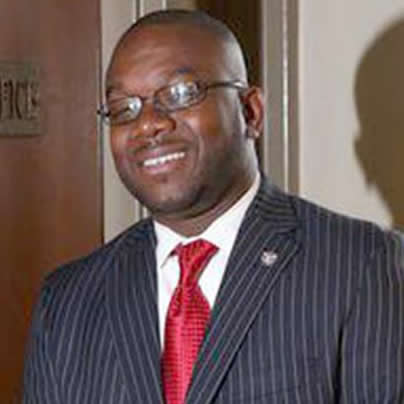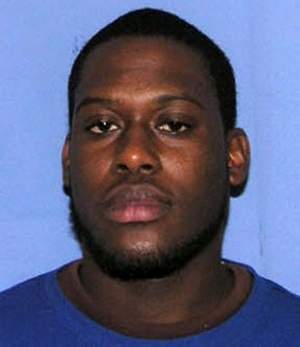National
Gay mayoral candidate murdered in Mississippi
Suspect arrested; sheriff says no evidence of hate crime


Marco McMillan (Photo courtesy of Facebook)
The motive for the murder of an openly gay candidate for mayor of the City of Clarksdale, Miss., and the exact cause of his death remained unclear on Friday, one day after sheriff’s deputies charged a 22-year-old man with the candidate’s slaying.
The Sheriff’s Office said the body of Marco McMillian, 34, one of four candidates running in the May 7 Democratic primary for mayor, was found Wednesday on an earthen levee next to the Mississippi River just outside of Clarksdale.
Although Sheriff’s Office officials said the motive for the murder was unclear, they said there was no evidence to indicate the incident was a hate crime or politically motivated.
The body was found one day after Lawrence Reed, the man arrested for the murder, was inside McMillian’s sports utility vehicle when it became involved in a head-on collision with another vehicle at a location miles away from where McMillian’s body was found, a spokesperson for the Sheriff’s Office said.
McMillian was not in the vehicle at the time of the collision. Authorities have not said whether they learned how Reed happened to be in the vehicle at the time of the accident or whether Reed and McMillian knew each other.
At the time they arrested Reed, the Sheriff’s Office also declined to disclose whether it was Reed or someone else who was driving the SUV at the time of the collision.
An emergency medical team airlifted Reed to a nearby hospital for treatment, the sheriff’s spokesperson, Will Rooker, said. The discovery that the SUV belonged to McMillian prompted the Sheriff’s Office to begin a search to find the candidate, whose campaign supporters said he failed to show up for a scheduled campaign meeting.
“We’re just all devastated over his loss,” said Jarod Keith, McMillian’s campaign spokesperson.
Keith told the Blade that although McMillian was viewed as an underdog in the race, he was considered a viable candidate who had a shot at winning.
“We had double the number of Facebook friends the other candidates had,” Keith said. “He would have been a great mayor.”
Clarksdale, which has a population of about 18,000, is a majority black city with an overwhelming majority of voters who are registered as Democrats. No Republican filed to run in the mayoral election.
An independent candidate entered the race and was expected to be on the ballot for the general election, which is scheduled for June 4.
McMillian was a Democrat with ties to Democratic Party activists in other parts of the country. His Facebook campaign page includes photos of him with former President Bill Clinton and then-Sen. Barack Obama.
He was competing against three other Democrats in the May primary, including Chuck Espy, the son of incumbent Mayor Henry Espy, who announced he was not running for re-election.
Henry Espy became Clarksdale’s first black mayor when he first won election to the post in 1989. Except for a four-year hiatus in the 1990s, Henry Espy has served as the city’s mayor since 1989, making it clear that the barrier of electing a black person as mayor of the Mississippi delta city had long been broken.
Keith said McMillian had hoped to break another barrier by becoming Mississippi’s first openly gay elected official. Although his sexual orientation was known to Clarksdale’s political establishment and the media, Keith said his campaign focused on McMillian’s vision for lifting the economy and quality of life for a community faced with poverty and a crime rate far higher than the national average.
Denis Dison, a spokesperson for the Gay and Lesbian Victory Fund, a national group that provides financial and logistical support for LGBT candidates for public office, said McMillian attended the Victory Fund’s annual LGBT Leadership Conference last November, where he promoted his candidacy.
McMillian served for four years as executive director of Phi Beta Sigma Fraternity, Inc., an internationally known black fraternity. He most recently served as CEO of MWM & Associates, a consulting firm for non-profit organizations. A biography on his website says he worked in the past at Alabama A&M University and Jackson State University.
U.S. Supreme Court
Supreme Court to consider bans on trans athletes in school sports
27 states have passed laws limiting participation in athletics programs

The U.S. Supreme Court on Thursday agreed to hear two cases involving transgender youth challenging bans prohibiting them from participating in school sports.
In Little v. Hecox, plaintiffs represented by the ACLU, Legal Voice, and the law firm Cooley are challenging Idaho’s 2020 ban, which requires sex testing to adjudicate questions of an athlete’s eligibility.
The 9th U.S. Circuit Court of Appeals described the process in a 2023 decision halting the policy’s enforcement pending an outcome in the litigation. The “sex dispute verification process, whereby any individual can ‘dispute’ the sex of any female student athlete in the state of Idaho,” the court wrote, would “require her to undergo intrusive medical procedures to verify her sex, including gynecological exams.”
In West Virginia v. B.P.J., Lambda Legal, the ACLU, the ACLU of West Virginia, and Cooley are representing a trans middle school student challenging the Mountain State’s 2021 ban on trans athletes.
The plaintiff was participating in cross country when the law was passed, taking puberty blockers that would have significantly reduced the chances that she could have a physiological advantage over cisgender peers.
“Like any other educational program, school athletic programs should be accessible for everyone regardless of their sex or transgender status,” said Joshua Block, senior counsel for the ACLU’s LGBTQ and HIV Project. “Trans kids play sports for the same reasons their peers do — to learn perseverance, dedication, teamwork, and to simply have fun with their friends,” Block said.
He added, “Categorically excluding kids from school sports just because they are transgender will only make our schools less safe and more hurtful places for all youth. We believe the lower courts were right to block these discriminatory laws, and we will continue to defend the freedom of all kids to play.”
“Our client just wants to play sports with her friends and peers,” said Lambda Legal Senior Counsel Tara Borelli. “Everyone understands the value of participating in team athletics, for fitness, leadership, socialization, and myriad other benefits.”
Borelli continued, “The U.S. Court of Appeals for the Fourth Circuit last April issued a thoughtful and thorough ruling allowing B.P.J. to continue participating in track events. That well-reasoned decision should stand the test of time, and we stand ready to defend it.”
Shortly after taking control of both legislative chambers, Republican members of Congress tried — unsuccessfully — to pass a national ban like those now enforced in 27 states since 2020.
Federal Government
UPenn erases Lia Thomas’s records as part of settlement with White House
University agreed to ban trans women from women’s sports teams

In a settlement with the Trump-Vance administration announced on Tuesday, the University of Pennsylvania will ban transgender athletes from competing and erase swimming records set by transgender former student Lia Thomas.
The U.S. Department of Education’s Office for Civil Rights found the university in violation of Title IX, the federal rights law barring sex based discrimination in educational institutions, by “permitting males to compete in women’s intercollegiate athletics and to occupy women-only intimate facilities.”
The statement issued by University of Pennsylvania President J. Larry Jameson highlighted how the law’s interpretation was changed substantially under President Donald Trump’s second term.
“The Department of Education OCR investigated the participation of one transgender athlete on the women’s swimming team three years ago, during the 2021-2022 swim season,” he wrote. “At that time, Penn was in compliance with NCAA eligibility rules and Title IX as then interpreted.”
Jameson continued, “Penn has always followed — and continues to follow — Title IX and the applicable policy of the NCAA regarding transgender athletes. NCAA eligibility rules changed in February 2025 with Executive Orders 14168 and 14201 and Penn will continue to adhere to these new rules.”
Writing that “we acknowledge that some student-athletes were disadvantaged by these rules” in place while Thomas was allowed to compete, the university president added, “We recognize this and will apologize to those who experienced a competitive disadvantage or experienced anxiety because of the policies in effect at the time.”
“Today’s resolution agreement with UPenn is yet another example of the Trump effect in action,” Education Secretary Linda McMahon said in a statement. “Thanks to the leadership of President Trump, UPenn has agreed both to apologize for its past Title IX violations and to ensure that women’s sports are protected at the university for future generations of female athletes.”
Under former President Joe Biden, the department’s Office of Civil Rights sought to protect against anti-LGBTQ discrimination in education, bringing investigations and enforcement actions in cases where school officials might, for example, require trans students to use restrooms and facilities consistent with their birth sex or fail to respond to peer harassment over their gender identity.
Much of the legal reasoning behind the Biden-Harris administration’s positions extended from the 2020 U.S. Supreme Court case Bostock v. Clayton County, which found that sex-based discrimination includes that which is based on sexual orientation or gender identity under Title VII rules covering employment practices.
The Trump-Vance administration last week put the state of California on notice that its trans athlete policies were, or once were, in violation of Title IX, which comes amid the ongoing battle with Maine over the same issue.
New York
Two teens shot steps from Stonewall Inn after NYC Pride parade
One of the victims remains in critical condition

On Sunday night, following the annual NYC Pride March, two girls were shot in Sheridan Square, feet away from the historic Stonewall Inn.
According to an NYPD report, the two girls, aged 16 and 17, were shot around 10:15 p.m. as Pride festivities began to wind down. The 16-year-old was struck in the head and, according to police sources, is said to be in critical condition, while the 17-year-old was said to be in stable condition.
The Washington Blade confirmed with the NYPD the details from the police reports and learned no arrests had been made as of noon Monday.
The shooting took place in the Greenwich Village neighborhood of Manhattan, mere feet away from the most famous gay bar in the city — if not the world — the Stonewall Inn. Earlier that day, hundreds of thousands of people marched down Christopher Street to celebrate 55 years of LGBTQ people standing up for their rights.
In June 1969, after police raided the Stonewall Inn, members of the LGBTQ community pushed back, sparking what became known as the Stonewall riots. Over the course of two days, LGBTQ New Yorkers protested the discriminatory policing of queer spaces across the city and mobilized to speak out — and throw bottles if need be — at officers attempting to suppress their existence.
The following year, LGBTQ people returned to the Stonewall Inn and marched through the same streets where queer New Yorkers had been arrested, marking the first “Gay Pride March” in history and declaring that LGBTQ people were not going anywhere.
New York State Assemblywoman Deborah Glick, whose district includes Greenwich Village, took to social media to comment on the shooting.
“After decades of peaceful Pride celebrations — this year gun fire and two people shot near the Stonewall Inn is a reminder that gun violence is everywhere,” the lesbian lawmaker said on X. “Guns are a problem despite the NRA BS.”
-

 U.S. Supreme Court3 days ago
U.S. Supreme Court3 days agoSupreme Court to consider bans on trans athletes in school sports
-

 Out & About3 days ago
Out & About3 days agoCelebrate the Fourth of July the gay way!
-

 Virginia3 days ago
Virginia3 days agoVa. court allows conversion therapy despite law banning it
-

 Federal Government5 days ago
Federal Government5 days agoUPenn erases Lia Thomas’s records as part of settlement with White House













